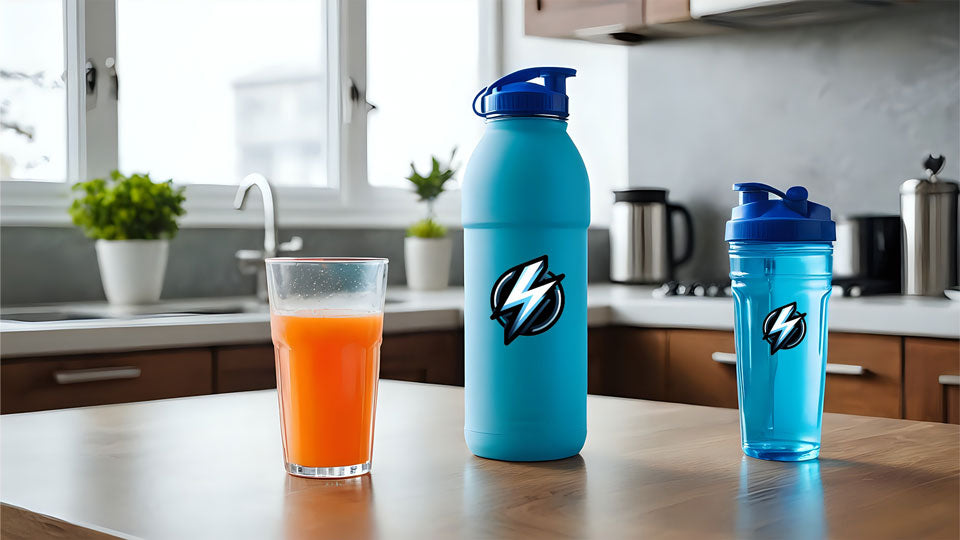You may have heard of electrolytes in terms of electrolyte water and the likes. If you've ever wondered why athletes guzzle sports drinks or why you’re told to rehydrate with electrolytes when you're sick, the answer lies in what they contain and the role they play in our bodies.
What are electrolytes, their functions, and how they benefit your health, especially in the context of physical performance? Find out as we focus on two of the most important ones, sodium and potassium, and explore their major benefits.
What Are Electrolytes?
In chemistry, Electrolytes are defined as elements that carry a charge. These elements or minerals are found in your blood, urine, and body fluids. Their role is basically to help balance the amount of water in your body and help transport nutrients into your cells. They also support a variety of other bodily functions. Some of the most common electrolytes include sodium, potassium, calcium, magnesium, chloride, and bicarbonate.
The body needs a specific balance of these electrolytes for it to function properly. Too much or too little of any single one of them can lead to health problems. This is why it's important to maintain the right levels.
The Benefits of Electrolytes
Electrolytes Help Maintain Hydration and Fluid Balance
This is probably what many people associate electrolytes with. They play a big role in maintaining the fluid balance in the body. Sodium, in particular, plays the largest role when it comes to regulating the amount of water in and around your cells. Without proper sodium levels, your body wouldn’t be able to retain water. The end result of this is dehydration.
Many studies show that sodium supplementation can improve the body’s ability to retain fluid by up to 50% compared to drinking plain water alone. A drastic drop in the levels of sodium in the body due to sweat leads to a condition called hyponatremia. Athletes usually suffer from this the most and it can lead to serious health risks if not properly managed.
They Prevent Muscle Cramps and Support Muscle Function
If you've ever experienced muscle cramps during or after exercise, chances are your electrolytes were out of balance. Electrolytes like sodium and potassium are essential for proper muscle function.
Sodium is particularly important in helping muscles contract, while potassium helps muscles relax. A balance between these two means they work together to prevent cramps and ensure smooth muscle movements.
However, when your body loses either too much sodium or potassium—such as through heavy sweating during exercise—you may experience painful cramps, muscle spasms, or weakness.
Enhance Endurance and Physical Performance
Endurance athletes, like long-distance runners or cyclists, are particularly vulnerable to electrolyte imbalances due to the high levels of sodium they lose through sweat. On average, these athletes can lose between 0.5 to 3 grams of sodium per hour while they perform their intense exercises. If they do not replenish these lost electrolytes, dehydration and decreased performance can set in quickly.
Sodium not only helps maintain hydration but also supports plasma volume. Research has shown that sodium intake during exercise can increase plasma volume by about 10%. In return, this helps to sustain endurance. Adequate sodium levels also improve nerve function and allow signals to travel efficiently from the brain to the muscles. The end result is it helps maintain coordination and stamina during prolonged physical activity.
Regulate Blood Pressure and Heart Health
We have said a lot about Sodium. The other electrolyte, potassium, has a major part to play in controlling blood pressure. And it does this by actually balancing the negative effects of sodium. Too much sodium leads to high blood pressure because of the extra contraction of blood vessels.
On the other hand, potassium helps to relax blood vessels and excrete sodium through urine, thereby lowering blood pressure. Studies have shown that increasing potassium intake can reduce systolic blood pressure by an average of 3.49 mm Hg and diastolic blood pressure by 1.96 mm Hg–especially in people who already have hypertension.
Improve Recovery After Exercise
Electrolytes are also helpful for recovery after exercise. Post-workout, your body needs to replenish the fluids and electrolytes lost through sweat. Rehydration with electrolytes ensures that your body restores its natural balance more efficiently.
It also reduces the risk of fatigue, muscle soreness, and dehydration. If there are any muscle tissues that may have been damaged during exercise, electrolytes also help repair them.
In Summary
Electrolytes are far more than just a random drink for after exercise. They are extremely beneficial for the proper functioning of our body. Sodium and potassium are two of the most important electrolytes that the body needs to function optimally. So, ensure that you’re consuming enough of these minerals through diet or supplements, especially if you participate routinely in exercise and sports.

Share: